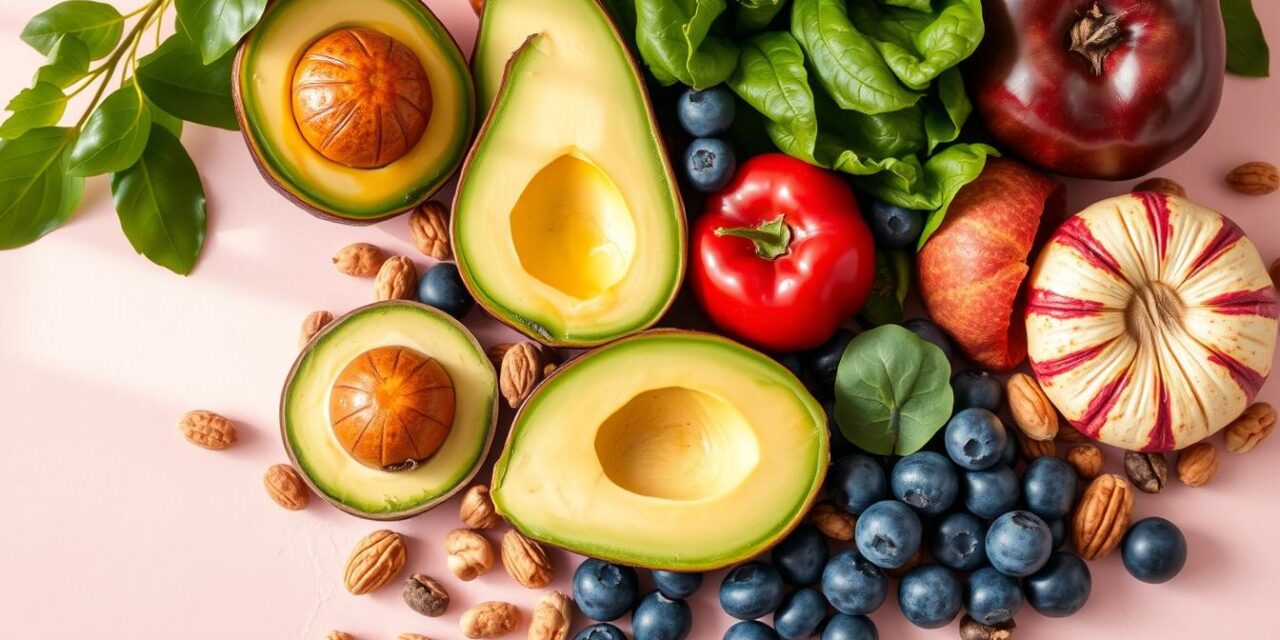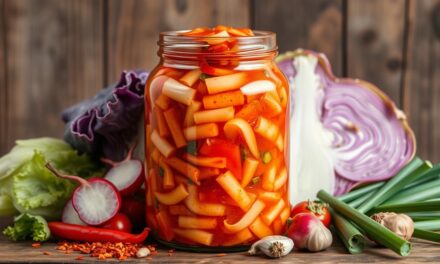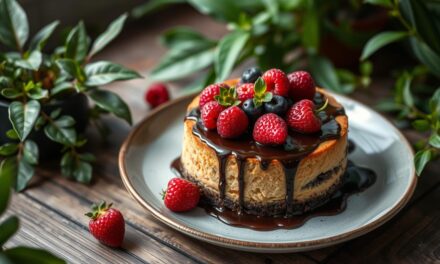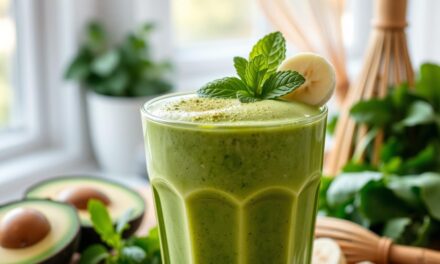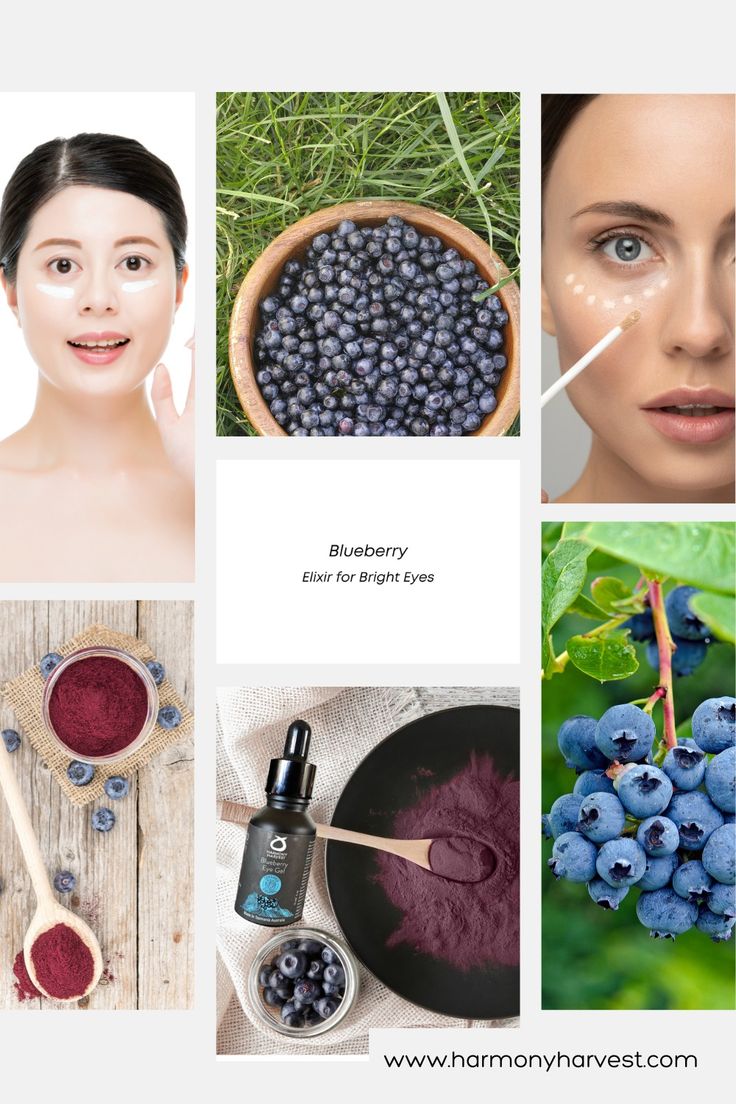Did you know 75% of Australians worry about early skin ageing? The bright side is, nature offers plenty of anti wrinkle food to fight ageing signs and boost a youthful glow. This guide explores how diet affects skin health, helping you choose an antioxidant-rich diet and use collagen-boosting nutrients for better skin.
Key Takeaways
- Discover the best anti-ageing foods that can help reduce the appearance of wrinkles and fine lines.
- Learn how specific nutrients and compounds in food affect skin cell regeneration and overall skin health.
- Explore the science behind the link between diet and skin, and the role of antioxidants in combating skin ageing.
- Gain practical tips on incorporating these skin-loving foods into your daily diet for maximum anti-wrinkle benefits.
- Understand the importance of collagen-boosting foods, omega-3 rich sources, and hydrating options for maintaining youthful, glowing skin.
Understanding the Connection Between Diet and Skin Health
The health of our skin is closely tied to what we eat. Eating anti-inflammatory foods and antioxidant-rich diet can greatly improve skin cell growth and look. Let’s explore the science behind this interesting link.
How Food Affects Skin Cell Regeneration
The food we eat is key to our skin’s health. Vitamins A, C, and E, and minerals like zinc, help our skin grow well and stay young. But, eating too much processed food, sugar, and unhealthy fats can slow down skin renewal. This can make our skin look dull and wrinkly.
The Science Behind Nutritional Skin Care
Recent studies show the power of “nutritional skin care”. It’s about feeding our skin with foods rich in antioxidants and anti-inflammatory properties. These foods fight off damage, reduce swelling, and help our skin make collagen. This leads to a brighter, more youthful look.
| Nutrient | Skin Benefits |
|---|---|
| Vitamin C | Promotes collagen synthesis, brightens the complexion, and provides antioxidant protection. |
| Omega-3 Fatty Acids | Reduce inflammation, improve skin hydration, and support the skin’s barrier function. |
| Zinc | Necessary for wound healing, skin cell regeneration, and oil production regulation. |
“A healthy, balanced diet rich in anti-inflammatory and antioxidant-rich foods can have a profound impact on the health and appearance of your skin.”
Essential Antioxidants That Combat Skin Ageing
Eating foods rich in antioxidants is key to fighting skin ageing. These nutrients protect the skin from damage caused by free radicals. This damage can lead to wrinkles and other signs of ageing.
Vitamins C and E are especially important in the battle against skin ageing. They work together to strengthen the skin and keep it looking young and bright.
Vitamin C-Rich Foods for Skin Protection
Vitamin C is a strong antioxidant that fights off harmful free radicals. It also helps reduce inflammation and boost collagen. Good sources of vitamin C include:
- Citrus fruits like oranges, lemons, and grapefruits
- Bell peppers
- Broccoli
- Kiwi
- Strawberries
The Benefits of Vitamin E-Rich Foods
Vitamin E is another crucial antioxidant that teams up with vitamin C. It protects the skin from UV damage and helps reduce wrinkles. Foods rich in vitamin E include:
- Almonds
- Avocados
- Sunflower seeds
- Spinach
- Olive oil
Adding a variety of antioxidant-rich foods to your diet helps keep your skin healthy. This way, you can enjoy a youthful look for longer.
| Antioxidant | Benefits for Skin | Top Food Sources |
|---|---|---|
| Vitamin C | Neutralizes free radicals, promotes collagen production | Citrus fruits, bell peppers, broccoli, kiwi, strawberries |
| Vitamin E | Protects skin from UV damage, reduces wrinkles | Almonds, avocados, sunflower seeds, spinach, olive oil |
“Antioxidants are like the superheroes of skin care, fighting off the villainous free radicals and keeping your complexion looking youthful and radiant.”
Top Anti Wrinkle Food Choices for Daily Consumption
Your diet is key to keeping your skin looking young and glowing. Adding certain foods to your diet can help fight signs of aging. Here are the best foods for morning and evening, along with how much to eat for the best results.
Morning Food Choices
Begin your day with foods that fight wrinkles. These are packed with nutrients your skin needs:
- Avocado: It’s full of collagen-boosting nutrients like vitamin C and healthy fats. Avocado is a great breakfast choice.
- Blueberries: They’re loaded with antioxidants that protect your skin from harm. Add them to your morning smoothie or oatmeal.
- Eggs: Protein-rich eggs help your skin cells grow and repair. They’re a perfect breakfast food.
Evening Dietary Recommendations
As night falls, eat foods that help your skin stay young. These are some of the best options:
- Salmon: It’s full of omega-3 fatty acids that reduce inflammation and make your skin more elastic.
- Sweet Potatoes: They’re rich in vitamin A which helps your skin cells renew and collagen grow.
- Nuts and Seeds: Eating protein-rich nuts and seeds like almonds, walnuts, and chia seeds boosts your skin’s health.
Optimal Portion Sizes
Getting the most from these anti-wrinkle foods means watching your portions. Here’s what to aim for:
| Food | Portion Size |
|---|---|
| Avocado | 1/2 medium avocado |
| Blueberries | 1 cup |
| Eggs | 2 large eggs |
| Salmon | 100-150g (3.5-5 oz) |
| Sweet Potatoes | 1 medium sweet potato |
| Nuts and Seeds | 1/4 cup |
By adding these foods to your daily meals, you can nourish your skin and keep it looking young and radiant.
Collagen-Boosting Foods for Skin Elasticity
Healthy, youthful skin needs a diet full of collagen-boosting nutrients. Collagen is key for skin structure and elasticity. It helps reduce wrinkles and fine lines. Eating the right protein-rich foods can nourish your skin and make it look vibrant and radiant.
Eating foods high in vitamin C is great for boosting collagen. Oranges and grapefruits are top choices. Vitamin C is vital for making collagen, so it’s essential for better skin elasticity.
- Oranges
- Grapefruits
- Lemons
- Limes
Protein-rich foods are also important for young-looking skin. Lean meats, fish, eggs, and dairy are full of amino acids needed for collagen.
| Food | Collagen-Boosting Benefits |
|---|---|
| Salmon | High in omega-3 fatty acids and protein, which support skin elasticity and hydration. |
| Bone broth | Contains gelatin, a natural source of collagen that can help replenish the skin’s own collagen levels. |
| Egg yolks | Rich in biotin, a B vitamin that aids in the production of collagen and keratin, which are essential for healthy skin. |
Adding these collagen-boosting nutrients and protein-rich foods to your diet can nourish your skin. It will help keep your skin looking young and radiant. Start a skin-friendly lifestyle and enjoy a healthy, glowing complexion.
Omega-3 Rich Foods and Their Impact on Skin Health
Omega-3 fatty acids are key for healthy, youthful skin. They hydrate and nourish the skin and fight inflammation. This helps reduce signs of ageing.
Fish and Seafood Options
Oily fish like salmon, mackerel, sardines, and tuna are full of omega-3s. These nutrients improve skin hydration, reduce wrinkles, and make skin look brighter and more elastic.
- Salmon: Rich in EPA and DHA, salmon is great for baking, grilling, or in salads.
- Sardines: Full of omega-3s, sardines are affordable and can be added to pasta, sandwiches, or eaten alone.
- Mackerel: A great source of anti-inflammatory omega-3s, mackerel is available canned or fresh for easy meals.
Plant-Based Omega-3 Sources
Plant-based diets have many omega-3 sources. While they don’t have as much EPA and DHA as fish, they’re still good for skin health.
- Chia seeds: Full of ALA, chia seeds are great on yogurt, in smoothies, or baked into treats.
- Walnuts: A rich source of ALA, walnuts are perfect for snacking, salads, or baked goods.
- Flaxseeds: Ground flaxseeds boost omega-3 intake, whether in oatmeal, cereal, or baked items.
Eating a variety of omega-3 foods daily nourishes your skin. It makes your skin healthy, radiant, and youthful.
Hydrating Foods That Promote Skin Moisture
Keeping your skin hydrated is key for a young, glowing look. Eating hydrating foods every day is the secret. These foods not only hydrate your skin but also give it vital nutrients to fight ageing signs.
Watermelon is a top choice for hydrating foods. It’s 92% water, making it perfect for skin hydration. Cucumber is also great, with lots of water and antioxidants for healthy, anti wrinkle skin.
- Tomatoes: Full of lycopene, an antioxidant that protects skin from sun damage and early ageing.
- Avocado: Rich in healthy fats that keep skin’s natural moisture and elasticity.
- Leafy greens: Spinach, kale, and Swiss chard are hydrating powerhouses with lots of vitamins and minerals for the skin.
| Hydrating Food | Water Content | Key Skin Benefits |
|---|---|---|
| Watermelon | 92% | Plumps and nourishes skin, fights wrinkles |
| Cucumber | 96% | Soothes and hydrates, reduces puffiness |
| Tomatoes | 94% | Protects against sun damage, improves skin elasticity |
Eating a variety of hydrating foods can change your skin’s health and look. These foods quench your skin’s thirst and give it the nutrients it needs. This way, you can get a more youthful, radiant look.
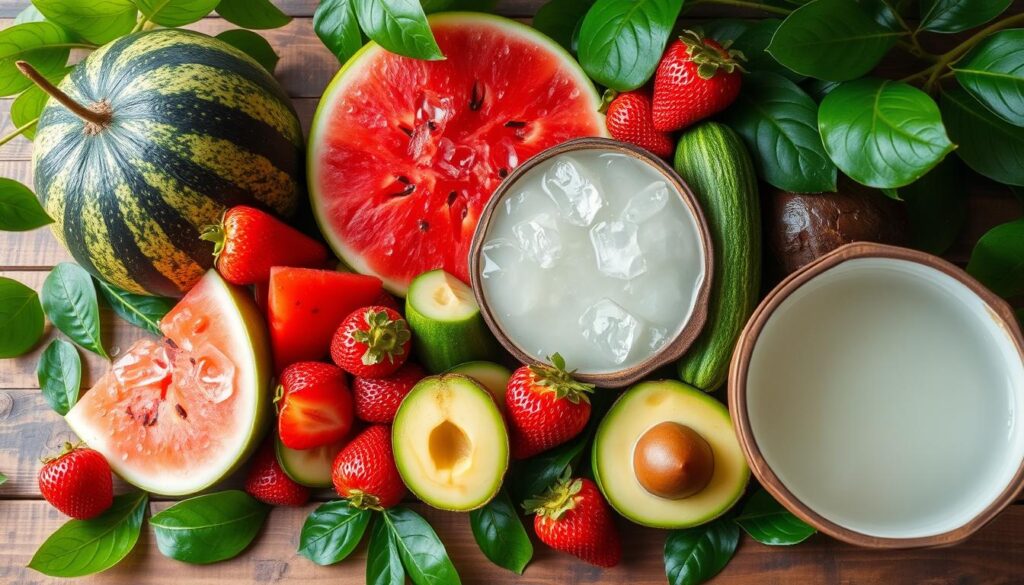
Vitamin C-Rich Foods for Natural Skin Protection
Vitamin C is a key antioxidant for healthy, young-looking skin. It fights skin ageing and protects against environmental stress. Eating foods rich in vitamin C can make your skin look bright and vibrant.
Citrus Fruits and Their Benefits
Citrus fruits like oranges, lemons, limes, and grapefruits are full of vitamin C. They add zest to meals and are good for your skin. Vitamin C in these fruits boosts collagen, keeping your skin elastic and firm. This reduces wrinkles and fine lines.
Other Vitamin C Food Sources
- Strawberries: Packed with antioxidants, strawberries are a fantastic source of vitamin C that can help protect the skin from environmental damage.
- Bell peppers: These vibrant veggies are bursting with vitamin C, making them a versatile and nutritious choice for skin health.
- Broccoli: A cruciferous vegetable rich in vitamin C, broccoli also contains sulforaphane, a compound that helps defend the skin against UV radiation.
- Kiwi fruit: A lesser-known vitamin C powerhouse, kiwi fruit can help improve skin’s moisture levels and reduce the visibility of wrinkles.
Eating a variety of vitamin C-rich foods is a great way to care for your skin. Choosing nutrient-dense foods helps your skin look healthy and radiant.
Zinc and Protein: Essential Nutrients for Skin Repair
Keeping your skin looking young and healthy isn’t just about what you put on it. What you eat matters a lot too. Zinc and protein are two key nutrients that help fix and renew your skin.
Zinc is a mineral that helps your skin heal and protect itself. It’s key for making collagen, which keeps your skin firm and elastic. Zinc also helps control inflammation and can help with acne.
Protein is the basic material for all cells in your body, including your skin. Eating enough protein helps your skin fix itself, grow back, and stay looking young.
Zinc-Rich Foods for Healthy Skin
- Oysters
- Red meat
- Poultry
- Beans
- Nuts and seeds
- Whole grains
Protein-Rich Foods for Skin Repair
- Lean meats (e.g., chicken, turkey, lean beef)
- Fish and seafood
- Eggs
- Dairy products (e.g., milk, yogurt, cheese)
- Legumes (e.g., lentils, chickpeas, black beans)
- Nuts and seeds
Eating a mix of zinc-rich and protein-rich foods can help your skin stay healthy and young. A diet full of nutrients is the best way to get glowing, radiant skin.
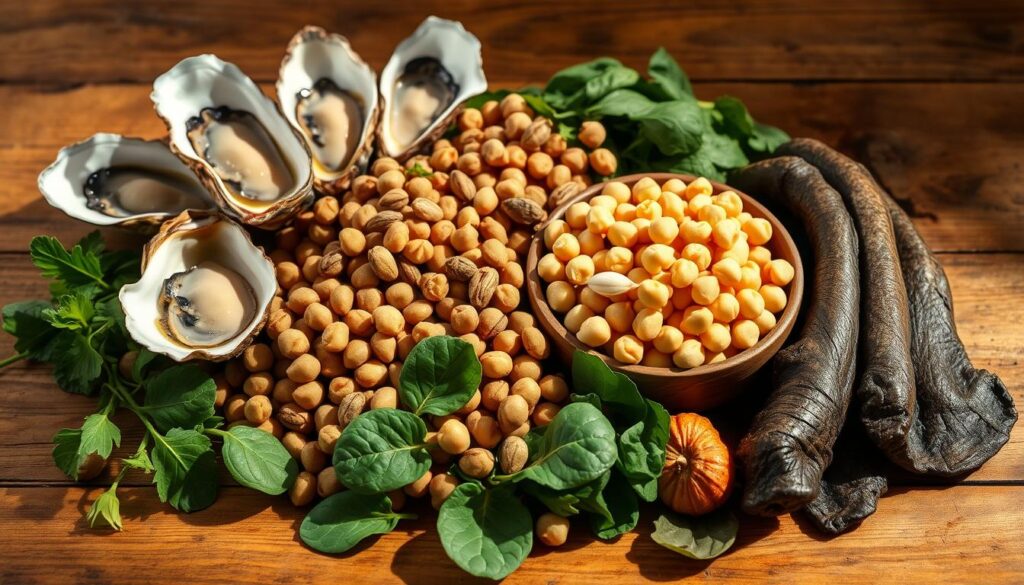
Foods to Avoid for Better Skin Health
An antioxidant-rich diet is great for your skin. But, some foods can make you look older and cause inflammation. It’s key to know which foods might harm your skin.
Inflammatory Culprits
White bread, pasta, and sugary snacks raise blood sugar and cause inflammation. This can damage collagen and elastin, leading to wrinkles. Eating anti-inflammatory foods like leafy greens and berries can help your skin.
Processed and Fried Foods
Fried and processed foods are bad for your skin. They’re full of unhealthy fats and additives that clog pores. Choose fresh, whole foods to keep your skin healthy and glowing.
Alcohol and Caffeine
Drinking too much wine or coffee can dry out your skin. Alcohol takes away nutrients and causes inflammation. Drinking in moderation and staying hydrated is important for your skin.
Choosing the right foods can help your skin stay healthy. An antioxidant-rich diet is essential for a youthful look.
| Foods to Avoid | Healthier Alternatives |
|---|---|
| Refined carbohydrates (white bread, pasta, sugary snacks) | Whole grains, leafy greens, berries |
| Processed and fried foods | Fresh, whole food options |
| Alcohol and caffeine | Moderate intake, balance with water |
“Nourishing the skin from the inside out is the key to a healthy, youthful complexion.”
Creating a Balanced Anti-Aging Meal Plan
Adding anti-wrinkle foods to your diet is crucial for youthful skin. Use a weekly meal plan and a shopping list to make it easy. This way, you can add these skin-friendly foods to your meals every day.
Weekly Meal Planning Guide
Begin your week with healthy breakfasts, lunches, and dinners. Include foods rich in antioxidants, collagen, and hydration. Mix lean proteins, healthy fats, complex carbs, and fresh fruits and veggies. This supports your skin’s natural renewal.
Shopping List Essentials
Make a detailed shopping list with anti-wrinkle foods like fatty fish, leafy greens, citrus fruits, and nuts. Keep your pantry and fridge full of these items. This makes it simple to prepare meals and snacks that boost your glow.
